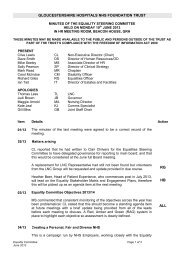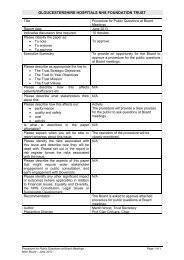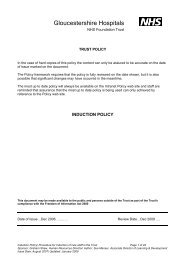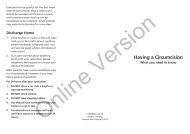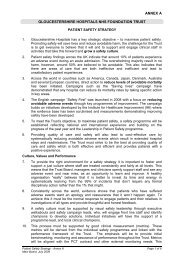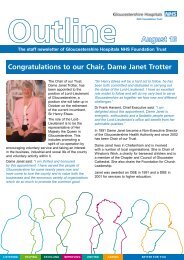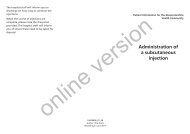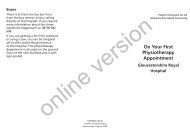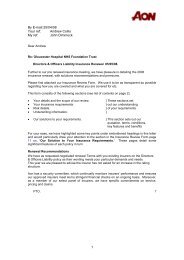Day Case Tonsillectomy for Adults
Day Case Tonsillectomy for Adults
Day Case Tonsillectomy for Adults
Create successful ePaper yourself
Turn your PDF publications into a flip-book with our unique Google optimized e-Paper software.
You must be driven home in a car or a<br />
taxi, and be accompanied by a responsible<br />
adult. A responsible, English speaking<br />
adult must stay with you <strong>for</strong> 24 hours after<br />
discharge.<br />
You are advised to have 2 weeks off work.<br />
If you require a certificate, this will be<br />
issued be<strong>for</strong>e you leave the ward.<br />
You should avoid contact with anyone who<br />
has a cold or is unwell and should avoid<br />
smoky and crowded environments <strong>for</strong> two<br />
weeks to reduce the risk of infection.<br />
You should not drive <strong>for</strong> at least 24 hours<br />
after your operation.<br />
There is a slight possibility that bleeding<br />
could occur from the tonsil bed <strong>for</strong> up to<br />
two weeks from the operation.<br />
If you have any fresh blood in your saliva<br />
or if you vomit fresh blood please contact<br />
your ward immediately and ask to speak to<br />
the nurse in charge.<br />
This may be due to post-operative<br />
infection and will require re-admission to<br />
the ward <strong>for</strong> antibiotic cover.<br />
Hospital follow up<br />
You will not need a follow up appointment.<br />
However, if you need advice or help you<br />
may contact the ward directly and ask to<br />
speak to the nurse in charge.<br />
Telephone number:<br />
Ward 1B – 08454 226184<br />
online version<br />
GHPI0499_03_05<br />
Author: Annette Achaiah<br />
Review due: March 2007<br />
Patient In<strong>for</strong>mation <strong>for</strong> the<br />
Gloucestershire Health Community<br />
<strong>Day</strong> <strong>Case</strong><br />
<strong>Tonsillectomy</strong> <strong>for</strong><br />
<strong>Adults</strong>
Introduction<br />
Many patients can now come into hospital<br />
<strong>for</strong> their tonsillectomy and go home on the<br />
same day.<br />
Your consultant will have assessed your<br />
suitability <strong>for</strong> day case tonsillectomy at your<br />
outpatient’s consultation.<br />
Be<strong>for</strong>e your operation you will be required<br />
to attend a pre-admission clinic, where a<br />
nurse will make a more detailed assessment<br />
to ensure your suitability <strong>for</strong> surgery.<br />
In order <strong>for</strong> you to have plenty of time to<br />
recover, your operation will be per<strong>for</strong>med<br />
at the beginning of a morning theatre list.<br />
What to expect<br />
The aim of this procedure is to surgically<br />
remove the tonsils under general<br />
anaesthetic.<br />
Be<strong>for</strong>e having a general anaesthetic it is<br />
important that your stomach is empty.<br />
Please do not have anything to eat after<br />
midnight. This includes chewing gum,<br />
sweets and chocolate. You may drink clear<br />
fluids up to 7am (e.g. water).<br />
Please bring any medication you take<br />
including inhalers with you. Take your<br />
normal dose on the morning of the<br />
operation.<br />
Following your operation<br />
Following the operation you will be<br />
observed by your nurse who will monitor<br />
your pulse regularly <strong>for</strong> several hours.<br />
Risks<br />
There is approximately a 1 in 200 risk of<br />
bleeding in the first eight hours after the<br />
operation.<br />
The risk of haemorrhage at 1 week after the<br />
operation is approximately 1 in 20.<br />
There is a risk of developing an infection<br />
about one week after the operation.<br />
There is always a small chance of damage to<br />
teeth or dental caps/crowns.<br />
Medication<br />
Immediately after the operation your throat<br />
will be sore and you may feel nauseous. You<br />
will be offered medicines to help alleviate<br />
any discom<strong>for</strong>t.<br />
You may also experience earache after<br />
tonsillectomy. This is because the nerve<br />
which supplies your throat is also connected<br />
to your ears.<br />
online version<br />
Once at home you will need to take the<br />
painkillers provided by the ward 1⁄2 hour<br />
be<strong>for</strong>e meals. This will enable you to eat and<br />
aid recovery.<br />
It is normal <strong>for</strong> your sore throat to feel<br />
worse be<strong>for</strong>e it gets better, usually around<br />
the fifth day after your operation. This is<br />
due to the healing process.<br />
Eating and drinking<br />
After your operation you may start to<br />
drink as soon as you wish. It is important<br />
to resume your normal diet as soon as<br />
possible. Chewing and swallowing will<br />
help relieve pain and remove any debris<br />
from the tonsil beds, helping to prevent<br />
infection.<br />
It is also advisable to drink plenty of<br />
fluids and to rinse your mouth well after<br />
each meal, particularly after eating dairy<br />
products.<br />
Do not worry if you notice white patches<br />
on your throat. These are normal and will<br />
last until your throat has healed.<br />
Leaving hospital<br />
Providing you make a good recovery, you<br />
should be well enough to go home in the<br />
early evening. A qualified nurse will assess<br />
your fitness <strong>for</strong> discharge. If you do not<br />
meet the criteria <strong>for</strong> same day discharge<br />
you will be required to stay overnight.



